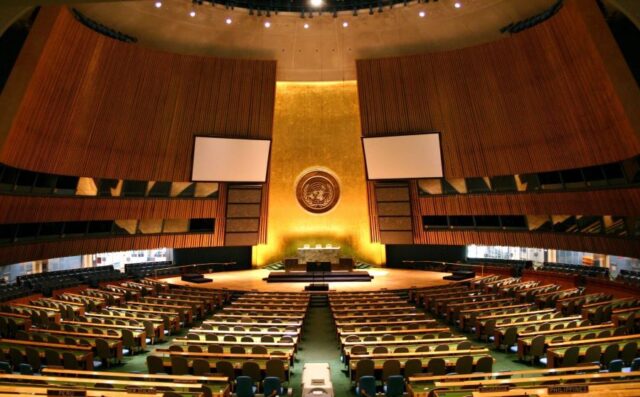…In 2023 alone, $2.4 trillion was spent globally on defense, while total climate finance in 2022 was only $1.3 trillion, most of which was directed to developed nations.
MON SEPT 23 2024-theGBJournal| As global leaders gather for the United Nations General Assembly (UNGA) in New York on September 22–23, 2024, African nations are making a resounding call for urgent, transformative action to address the accelerating climate crisis, global financial disparities, and the burden of unsustainable debt.
Africa’s core demands include:
-Reforming the Global Financial System: African leaders are calling for reforms of the global financial system to ease the debt burden on developing nations. Lowering interest rates and making debt restructuring mechanisms more accessible are key to ensuring financial stability and resilience in the face of climate challenges.
-Robust Climate Finance: African nations are pushing for the establishment of a new global climate finance target of at least $1.3 trillion, comprised of grants and concessional funding that acknowledges the realities of debt sustainability and the ongoing debt crisis. African leaders must stress that climate finance must be accessible, lower the cost of capital, and avoid further deepening global inequalities.
In 2023 alone, $2.4 trillion was spent globally on defense, while total climate finance in 2022 was only $1.3 trillion, most of which was directed to developed nations. This imbalance must be corrected, and the international community must commit to allocating substantial financial resources to the regions most affected by climate change, such as Africa.
-Debt Relief and Restructuring: Many African countries are grappling with unsustainable debt levels that severely limit their ability to invest in climate adaptation and resilience. The continent urgently calls for comprehensive debt relief and restructuring mechanisms that create the fiscal space needed for sustainable development and climate action.
-Just Transition: Africa is advocating for a just transition to a low-carbon economy, ensuring that vulnerable communities are prioritized and that the shift to renewable energy is equitable. The benefits of a green energy future must be shared fairly, without leaving the most vulnerable behind.
Africa is already bearing the brunt of climate impacts, with lives and livelihoods under threat. 2024 is expected to be the hottest year on record, surpassing 2023, as extreme weather—cyclones, droughts, heatwaves, and floods—continues to devastate communities across the continent.
With the world at a critical juncture, UNGA 2024 presents an opportunity for leaders to signal their commitment to submitting robust national climate action plans, and with just weeks remaining until COP29, African nations are calling for a decisive New Collective Quantified Goal (NCQG) for climate finance, urging world leaders to inject political momentum into the process to ensure that the outcome is successful and meaningful.
The world’s most advanced economies, particularly G7 countries—including the US, UK, EU, Japan, and Canada—must take a leadership role in addressing the climate crisis. These nations are urged to support debt relief efforts, ensure equitable access to climate finance, and demonstrate greater political will in tackling global climate and economic issues.
UNGA 2024 is a pivotal moment for world leaders to unite and take bold, coordinated action to support Africa’s climate agenda. The call to address financial injustice, secure climate finance, and ensure sustainable development for Africa and the world has never been more urgent.
According to Samson Mbewe, Technical Programme Manager at SouthSouthNorth, “As world leaders convene for the 79th United Nations General Assembly, we stand at a critical juncture demanding urgent action to reform our global financial and economic systems.
For Africa, this is not merely about gaining access to finance; it is a call to enable transformative change through a development finance ecosystem that equitably and inclusively addresses the continent’s unique challenges. We must forge pathways for sustainable investments that enhance climate resilience, promote fair development, and respect the fiscal sovereignty of developing nations as they pursue their own strategies.
By facilitating access to and the flow of finance tailored to Africa’s needs, we can empower its nations to confront pressing challenges and build a future where no one is left behind. This is a pivotal opportunity for us to redefine global cooperation and turn our shared aspirations for sustainability into reality. Let us act decisively at the UNGA to create a more equitable future for all.”
“As Pandemic Action Network, we urge global leaders to do the following:
Put people first; the escalating interconnected challenges facing humanity respect no borders as the COVID-19 pandemic and the current mpox outbreak illustrate. The world needs a solidarity driven, equity focused multilateral system that puts human life before profits and any other nationalistic interest,” says says Aggrey Director, Africa Region, at Pandemic Action Network.
He adds, ”We all now know that a threat of a disease anywhere can be a threat everywhere, in no time. The global leadership must expedite the conclusion of the INB for pandemic agreement, and ensure entrenching of a framework that anchors equity, accountability, and public interest, including the removal of all barriers (IP, Tech and Know-how transfer) to enhance the distribution of capacity to produce essential medical countermeasures, especially in LMIC.
All voices count equally – ensure reforms of the multilateral systems to enhance the inclusion of voices of all citizens from across the global divide in all their diversity, to inform the development of normative frameworks and governance of the multilateral systems. Systems that privilege other voices, mainly from rich global North countries and excluding others from LMIC global south, have failed to deliver. All multilateral systems and spaces must also ensure equitable and meaningful participation of Civil society in all their diversities.
Systems are only effective to the extent that they reflect the needs of those they seek to serve.
Reform MDBs to better respond to the interconnected global challenges: Initiate reforms in MDBs to enhance democratic operations to ensure pro-citizen approaches that include engaging with civil society at the country level to maximize impact, mitigate risks, foster public buy-in, and tackle the poly-crisis using an inclusive whole-of-society approach.”
X-@theGBJournal|Facebook-the Government and Business Journal|email:gbj@govbusinessjournal.com|govandbusinessj@gmail.com










